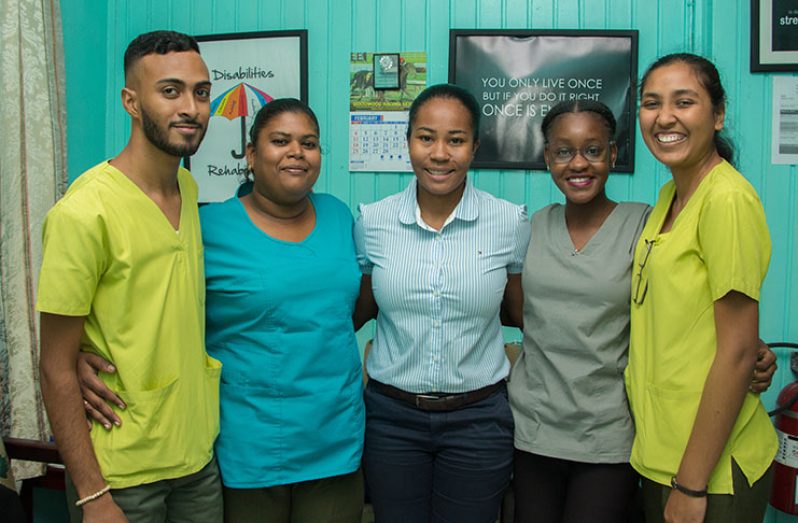AFEEZA Khan, Deoranie Babulall, Errica Canterbury and Calvin Lawrie must be celebrated as the history-making Guyanese quartet in the field of occupational therapy.
When they strolled across the University of Guyana (UG) graduation stage to receive their Bachelor of Science Degrees in Medical Rehabilitation in Occupational Therapy in November 2017, the quartet became the first ever locally educated and employed in that discipline.
In the past, work in occupational therapy in Guyana was done by members of the US Peace Corps and Voluntary Service Organisations (VSOs) who also helped train locals to be rehab assistants.
Occupational therapists treat injured, ill, or disabled patients through the therapeutic use of everyday activities. They help these patients develop, recover, improve, as well as maintain the skills needed for daily living and working.
Historically, there have always been locally-trained and employed physio and speech therapists, but never occupational therapists, confirmed Ms. Ariane Mangar, a UG lecturer and Director of Disability and Rehabilitation at the Ministry of Public Health (MoPH) during an interview this week.
As trailblazers, Khan, Babulall, Canterbury and Lawrie have assured they will be difference-makers at the Georgetown Public Hospital Corporation (GPHC); the Palms Geriatric Home; the West Demerara Regional Hospital (WDRH) and the Ptolemy Reid Rehabilitation Centre respectively, where they are employed.
In Lawrie’s view, all are candidates for rehabilitation.
“Everybody needs rehab in some way or the other,” he said, flashing his characteristic grin followed almost instantaneously with his infectious laughter.
As a tutor at the Ptolemy Reid Rehab Centre, Lawrie sees first-hand the daily struggles of children compounded by the absence of badly-needed updated policy to guide the sector.
For him, teachers at every level of the education system must receive rudimentary training to spot disabilities among students and the wider labour sector must provide “on-the-job” therapy for workers in need.
“If you start therapy early, patients can get better faster,” the UG graduate said, appealing to the Ministries of Education and Public Health to forge stronger bonds in the quest.
Educators and employers should also exhibit greater compassion by retrofitting offices, securing patient-friendly furniture and modifying their teaching methods to suit the learning styles of children and comfort for employees with disability as needed, Lawrie counselled.
CARDINAL
Restoring patients’ independence is cardinal in Babulall’s daily work at the Palms. As a pioneering occupational therapist, her methods at first made patients hesitant, but after two months they have been embracing it, she said.
Breaking cultural barriers in the field of therapy was the first hurdle Babulall achieved. For Guyanese, only physiotherapy previously existed and with the coming of the ‘new-kid-on-the-block’ occupational therapy, there were mental hurdles to master.
There are some 45,000 Guyanese undergoing therapy. Sight impairments accounts for 30 per cent, mobility 16.4 per cent; body movement 10 per cent; hearing related 9.1 per cent and mental impairment 8.3 per cent. Data indicates that “the need for disability and rehabilitation services may be significantly higher than suggested by the (2010) Census Report alone”.
“Disability shouldn’t rob you of opportunities,” the perennially-optimistic Afeeza Khan, who is attached to the GPHC, said. But patients are unwittingly robbing themselves of opportunities for full rehabilitation by skipping their rehab timetable.
At the referral hospital, Khan said “getting patients to honour their daily schedule” is her biggest challenge.
She reminded that “occupational therapy will help victims reintegrate into society,” faster. Khan is currently on a campaign to “bring awareness” about the differences between occupational and physio therapies to GPHC staff, patients and their families.
Meanwhile, Errica Canterbury wants the spotlight focus more on those invisible elements which provide daunting challenges for sufferers and the healthcare system alike. Guyana must zero in on mental health; bipolar disorders; stress and post-traumatic stress disorder (PTSD), the WDRH staffer said.
In the rehabilitation sector, Guyana’s current seven-year plan which concludes in 2020, has several key components: strengthening the health system for disability and rehabilitation services; improving accessibility; promoting prevention; minimising and preventing further disabilities and mobilising resources/finances through partnerships.
The four ground-breakers want leisure and enjoyment to be fully part of the country’s programme for rehabilitating patients who are “…not less of a person because of your disability”.
“With fun there is (faster) progress” in rehabilitation, said Lawrie, who received approving nods from his three colleagues.
They gave their assent too when he noted that rehab “is no quick-fix but a gradual process” and that despite national policies and programmes “the family is the support system for rehabilitating patients and what happens in the home is a big part of rehabilitation”.
After more than 50 years as an Independent State, Guyana has only now begun to harvest its home-grown occupational therapists and the future in the field is bright “despite the challenges,” Babulall said.
“Open your eyes, open your doors (and) open your businesses to people with disabilities,” the history-making Khan pleaded.
(Ministry of Public Health)




.png)









